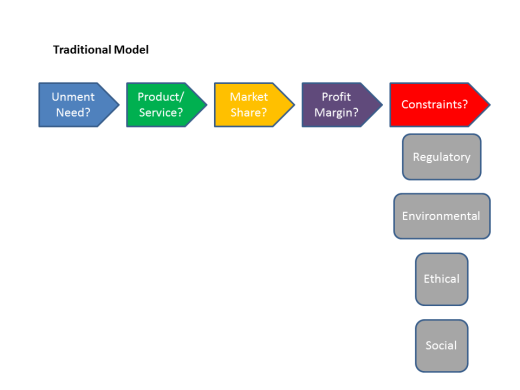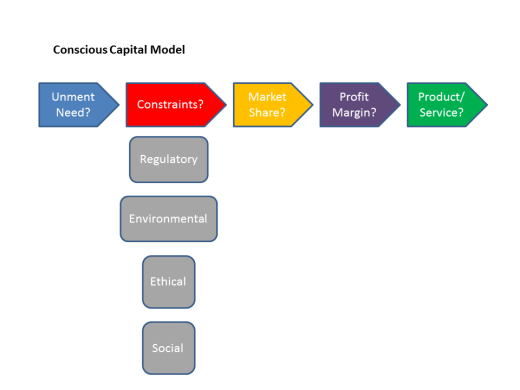There are those who argue that capitalism is driven and fueled by greed. As a result, the concept of consciousness (not as in awareness but as in limitations, responsibilities and constraints) cannot be applied (or at least has never been applied). In order to better understand this concept it is important to understand the distinction between “conscious” and “consciousness”
Conscious: “capable of or marked by thought, will, design, or perception” (Source: http://www.merriam-webster.com/dictionary/conscious)
Consciousness: “the upper level of mental life of which the person is aware as contrasted with unconscious processes” (Source: http://www.merriam-webster.com/dictionary/consciousness)
Business by design involves thought, will, and perception (markets, demand, supply, planning, strategy). Hence businesses are conscious. However, assuming that profits/greed are the primary motivation, does this create unconscious processes?
Before one begins exploring consciousness, one must first determine what is the primary purpose of business? The late Nobel prize winner Ronald Cause put forth that the primary focus of business is to increase efficiency
The Nature of Firms and Their Costs http://www.dallasfed.org/assets/documents/research/ei/ei0303.pdf
Some would argue that business makes profit in direct proportion to its ability to assume and manage risk efficiently. Assumption of risk while simultaneously maximizing efficiency is not a focus of either government or the social/non-profit sector. Government exists to manage regulation. The social/non-profit sector exists to service needs that cannot be monetized.
Tragedies like Easter Island are often used to describe the ills of capitalism. However, this begs the question, why hasn’t the same extinction already happened in other areas that have been using capitalism since the 1800’s? Situations like Tragedy of the Commons have shown us that continuous consumption (driven by greed or by lack of control) is detrimental even without the forces of capitalism. At the same time, the Great Depression and recent economic bubble bursts (dot.com/dot bomb, housing, banking) show the devastating effects of what Alan Greenspan termed irrational exuberance. http://www.capitalinstitute.org/content/tony-greenham#.Ui1rsNKsiSo There are economists who have examined the notion that unfettered greed collapses capital markets.
http://economistsview.typepad.com/economistsview/2008/02/joseph-stiglitz.html
http://scholarfp.blogspot.com/2013/05/what-would-adam-smith-say-about.html
Hence, albeit far from perfect, there is clear evidence that the notion of constraint does exist in business. The tricky part in unconscious processes is the notion of harm. How do we define harm? Is it just social cost or is it also lack of maintenance and improvement? As an example, we start to use trees for paper. In the beginning there are more than enough trees so there is no harm in cutting them. At what point do we begin to realize that we are running out to trees and what do we do about this? The same applies to process efficiency, automation and the availability to jobs. At first we seek to improve the human condition by automating dangerous or physically deteriorating tasks. We seek to free human time up for higher order thinking instead of rote tasks but have we trained everyone to the point where no one needs rote tasks in order to earn a living? What about intangible issues like happiness (yes we are beginning to measure it, Gross National Happiness Index)? Is consciousness an issue of morality or practicality? What about unanticipated reactions by those not inside the business? If a business builds containers and these containers are used by terrorists to build bombs, can the business be blamed for not foreseeing this consequence? As Coase cautioned business intervention often creates, “…other changes in the system which are inevitably associated with the corrective measure, changes which may well produce more harm than the original deficiency….”
The fundamental question that gets asked in light of all this is: can a business be moral AND make a profit? http://qz.com/105311/is-it-possible-to-have-morality-in-a-free-market/
There are many who answer with a resounding yes!
Overview http://en.wikipedia.org/wiki/Conscious_business
Concept Origins http://www.bentley.edu/events/conscious-capitalism-past-events/inaugural-conceptualizing-conscious-capitalism-conference
Mindset
http://murfdipity.com/conscious-capitalism/
The following diagrams summarize what needs to occur in order for business consciousness to happen:
The results? Here is a sampling of companies:
Saving sight and recycling http://www.soloeyewear.com/
Materials technology http://www.umicore.com/en/ (Ranked #1 in 2013 as World’s Most Sustainable Company)
Saving trees by using agricultural residue http://treefreepaper.com/
Quality home care and quality jobs http://www.chcany.org/ (Ranked #1 in B Corp’s 2013 Best for the World list)


Leave a comment